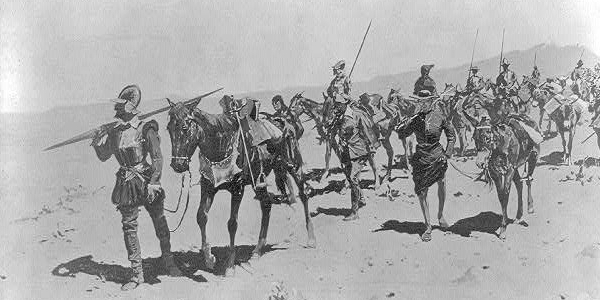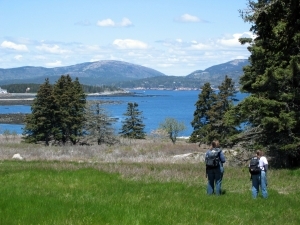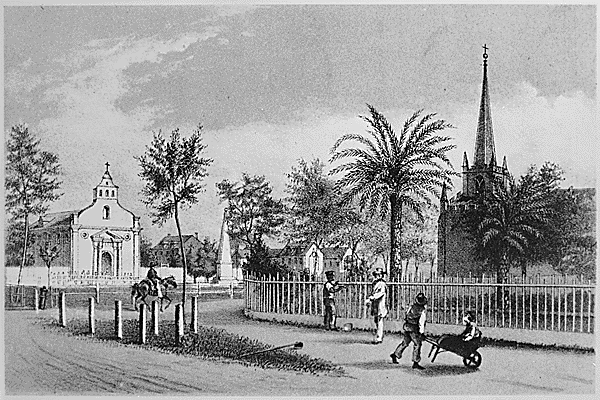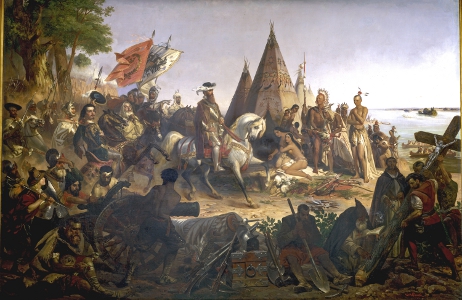
Above: Painting, entitled Discovery of the Mississippi, by William H. Powell, 1847, is located in the Rotunda of the Capitol in Washington, D.C. Right: Giovanni de Verrazzano, 1889, engraving by F. Allcarini, Tocchi, courtesy Wikipedia Commons.
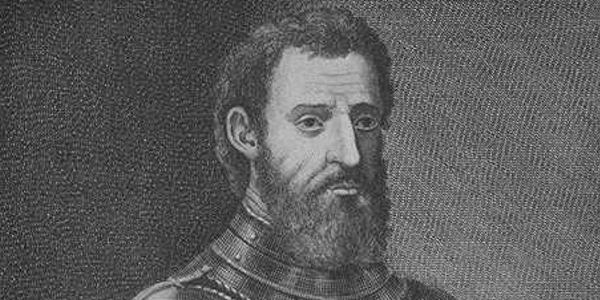
Sponsor this page for $75 per year. Your banner or text ad can fill the space above.
Click here to Sponsor the page and how to reserve your ad.
-
Timeline
Detail - 1579
July 26, 1579 - Sir Francis Drake leaves San Francisco to traverse the Pacific Ocean.

The explorers of Francis Drake had been there only a month, but his stay in New Albion, in today's California, claiming that land for Great Britain, had been significant. He had established friendly relations with the natives of the area, although that did not, in the end, assist in their claims to the area when the Spanish came calling later. At the time, they, the Spanish, had never ventured this far north.
"The Spaniards neuer had any dealing, or so much as set a
foote in this country, the vtmost of their discoueries reach-
ing onely to many degrees Southward of this place," Drake's Chaplain Francis Fletcher.
For the British, their west coast empire would eventually be headquartered north, in Oregon and in Canada. So, on July 23, 1579, they left the company of the coastal tribe after this one month on California land with Sir Francis Drake ordering his crew back on board the Golden Hind. They sailed out of San Francisco Bay to head west into the Pacific Ocean, three days later, after a stop on the Farallon Islands. It would be sixty-eight days on the ocean before they would see land again.

Excerpt from original account by Drake's Chaplain Francis Fletcher
The 23 of July they tooke a sorrowfull farewell of vs, but
being loath to leaue vs they presently ramie to the top of
the hils to keepe vs in their sight as long as they could,
making fires before and behind, and on each side of them,
burning therein (as is to be supposed) sacrifices at our departure.
Not farre without this harborough did lye certaine Hands
(we called them the Hands of Saint James), hauing on them
plentifull and great store of Seales and birds, with one of
which wee fell July 24, whereon we found such prouision
as might competently serue our turne for a while. We de-
parted againe the day next following, viz., July 25. And
our Generall now considering that the extremity of the cold
not only continued, but increased, the Sunne being gone far-
ther from vs, and that the wind blowing still (as it did at
first) from the Northwest, cut off all hope of finding a passage
through these Northerne parts, thought it necessarie to loose
no time ; and therefore with generall consent of all, bent his
course directly to runne with the Hands of the Moluccas.
And so hauing nothing in our view but aire and sea, without
sight of any land for the space of full 68 dayes together, wee
continued our course through the maine Ocean, till September 30 following, on which day we fell in kenne of certaine
Hands, lying about eight degrees to the Northward of the
line.
From these Hands, presently vpon the discouery of vs,
came a great number of canowes, hauing in each of them
in some foure, in some sixe, in some fourteene or fifteene
men, bringing with them Coquos, fish, potatoes, and certaine
fruites to small purpose. Their canowes were made after
the fashion that the canowes of all the rest of the Hands of
Moluccas for the most part are, that is, of one tree, hollowed
within with great art and cunning, being made so smooth,
both within and without, that they bore a glosse, as if it were
a harnesse most finely burnished. A prowe and sterue they
had of one fashion, yeelding inward in manner of a semi-circle, of a great height, and hanged full of certaine white
and glistering shels for brauery: on each side of their
canowes, lay out two peeces of timber, about a yard and a
halfe long, more or lesse, according to the capacitie of their
boate. At the ende whereof was fastned crossewise a great
cane, the vse whereof was to keepe their canowes from ouer-
tlirowing, and that they might be equally borne vp on each
side, ..." Chaplain Francis Fletcher.

Path of Drake's Pacific Journey
After leaving New Albion and journeying across the Pacific Ocean for sixty-eight days, Drake and the repaired Golden Hind reached landfall. It is unknown what its exact location was, however, his exploration of the Pacific islands is generally thought to have traveled, at first, to the Maluku Islands, Moluccas, part of today's eastern Indonesia. They traveled around the islands of Indonesia, reaching Mindanao on October 21, 1579, then what crew members called the hands of the Moluccas, islands they called Tirendte, Tidore, Matchan, Batchan, and Gillola. They befriended the Sultan, Babullah of Ternate, in the Moluccas, who purportedly controlled one hundred islands, while causing some trouble with the Portuguese who were already in Tidore, now enemies of the Sultan.
Excerpt from original account by Drake's Chaplain Francis Fletcher
We directed our course to haue gone to Tidore, but in
coasting along a little Hand belonging to the king of Terenate,
November 4, his deputy or Viceroy with all expedition came
off to our ship in a canow, and without any feare or doubting of our good meaning came presently aboard. Who after some conference with our Generall, intreated him by any meanes to runne with Terenate, not with Tidore, assuring him that his king would be wondrous glad of his comming, and be ready to do for him what he could, and what our Generall in reason should require. For which purpose he himselfe would that night bee with his king to carry him the newes; with whom if he once dealt, he should find, that as he was a king, so his word should stand: whereas if he dealt with the Portingals (who had the command of Tidore) he should find in them nothing but deceit and treachery. And besides that if he went to Tidore before he came to Terenate, then would his king haue nothing to doe with vs, for he held the Portingall as an enemy. On these perswasions our
Generall resolved to runne with Terenate, where the next
day, very early in the morning, we came to anchor: and presently our General sent a messenger to the king with a veluet cloake, for a present and token that his comming should be in peace; and that he required no other thing at his handsj but that (his victuals being spent in so long a voiage) he might haue supply from him by way of traffiquc and exchange of marchandise (whereof he had store of diners sorts) of such things as he wanted. Which he thought he might be the bolder to require at his hands, both for that the thing was lawfull, and that he offered him no preiudice or wrong therein, as also because he was intreated to repaire to that place by his Viceroy at Mutir, who assured him of necessarie prouision in such manner as now he required the same.
Before this the Viceroy, according to his promise, had
beene with the king, signifying vnto him what a mighty
Prince and kingdome we belonged vnto, what good things
the king might receiue from vs, not onely now, but for hereafter by way of traffique: yea what honour and benefit it
might be to him, to be in league and friendship with so noble
and famous a Prince as we serued: and farther, what a discouragement it would be to the Portugals his enemies to
heare and see it. In hearing whereof the king was so presently moued to the well liking of the matter, that before
our messenger could come halfe the way, he had sent the
Viceroy, with diuers others of his Nobles and Councillors to
our Generall, with speciall message that he should not onely
haue what things he needed, or would require with peace
and friendship, but that he would willingly entertaine amitie
with so famous and renowned a Princes as was ours; and
that if it seemed good in her eyes to accept of it, he would
sequester the commodities and traffique of his whole Hand
from others, especially from his enemies the Portugals (from
whom he had nothing but by the sword), and reserue it to
the intercourse of our Nation, if we would embrace it. In
token whereof he had now sent to our Gc iu-rall his siunol
and would within short time after come in his owne person,
with his brethren and Nobles, with boates or canowes into
our ship, and be a nieanes of bringing her into a safer harbour.
While they were deliuering their message to vs, our messenger was come vnto the court, who being met by the way by certaine noble personages, was with great solemnitie conueied into the king's presence, at whose hands he was most friendly and graciously entertained; and hauing deliuered his errand, together with his present vnto the king, the king seemed to him to judge himselfe blame-worthy, that he had not sooner hasted in person to present himselfe to our Generall, who came so farre and from so great a Prince; and presently, with all expedition, he made ready himselfe with the chiefest of all his States and Councillors, to make repaire vnto vs.
The manner of his comming, as it was princely, so truly it
seemed to vs very strange and maruellous: seruing at the
present not so much to set out his owne royall and kingly
state (which was great), as to do honour to her highnesse to
whom we belonged; wherein how willingly he imployed
himselfe, the sequell will make manifest.
First, therefore, before his comming, did he send off 3
great and large Canowes, in each whereof were certaine of
the greatest personages that were about him, attired all of
them in white Lawne, or cloth of Calecut, hauing ouer their
heads, from one end of the Canow to the other, a couering of
thinne and tine mats, borne vp by a frame made of recdes,
vnder which euery man sate in order according to his dignitie; the hoary heads of many of them, set forth the greater
reuerence due to their persons, and manifestly shewed that
the king vsed the aduice of a graue and prudent Counsell in
his affaires. Besides these were diuerse others, young and
comely men, a great number attired in white, as were the
other, but with manifest differences: hauing their places also
vnder the same couering, but in inferior order, as their calling required," Chaplain Francis Fletcher.
The Golden Hind ran aground on a reef within the Indonesian archipelago on January 9, 1580 before shifting winds several days later allowed it to escape the reef. After that, they headed into the Indian Ocean. By September, they had returned to England and reported back to Queen Elizabeth I.
Image above: Montage (background) photo of the replica of the Golden Hind in London, 2007, Josef L. Marin. Courtesy Wikipedia Commons CC3.0; (inset) portrait of Francis Drake, circa 1590, Marcus Gheeraerts the Younger. Courtesy Buckland Abbey via Wikipedia Commons. Below: Engraving of Sir Francis Drake, Date Unknown, W. Hall. Courtesy Library of Congress. Source info: Library of Congress; drake.mcn.org, "Francis Drake and the California Indians, 1579," 1947, Robert F. Heizer; "The World Encompassed" based on the notes of Francis Drake's Chaplain, Francis Fletcher, 1628; Archive.org; Wikipedia.

History Photo Bomb
Excerpt from original account by Drake's Chaplain Francis Fletcher
We directed our course to haue gone to Tidore, but in
coasting along a little Hand belonging to the king of Terenate,
November 4, his deputy or Viceroy with all expedition came
off to our ship in a canow, and without any feare or doubting of our good meaning came presently aboard. Who after some conference with our Generall, intreated him by any meanes to runne with Terenate, not with Tidore, assuring him that his king would be wondrous glad of his comming, and be ready to do for him what he could, and what our Generall in reason should require. For which purpose he himselfe would that night bee with his king to carry him the newes; with whom if he once dealt, he should find, that as he was a king, so his word should stand: whereas if he dealt with the Portingals (who had the command of Tidore) he should find in them nothing but deceit and treachery. And besides that if he went to Tidore before he came to Terenate, then would his king haue nothing to doe with vs, for he held the Portingall as an enemy. On these perswasions our
Generall resolved to runne with Terenate, where the next
day, very early in the morning, we came to anchor: and presently our General sent a messenger to the king with a veluet cloake, for a present and token that his comming should be in peace; and that he required no other thing at his handsj but that (his victuals being spent in so long a voiage) he might haue supply from him by way of traffiquc and exchange of marchandise (whereof he had store of diners sorts) of such things as he wanted. Which he thought he might be the bolder to require at his hands, both for that the thing was lawfull, and that he offered him no preiudice or wrong therein, as also because he was intreated to repaire to that place by his Viceroy at Mutir, who assured him of necessarie prouision in such manner as now he required the same.
Before this the Viceroy, according to his promise, had
beene with the king, signifying vnto him what a mighty
Prince and kingdome we belonged vnto, what good things
the king might receiue from vs, not onely now, but for hereafter by way of traffique: yea what honour and benefit it
might be to him, to be in league and friendship with so noble
and famous a Prince as we serued: and farther, what a discouragement it would be to the Portugals his enemies to
heare and see it. In hearing whereof the king was so presently moued to the well liking of the matter, that before
our messenger could come halfe the way, he had sent the
Viceroy, with diuers others of his Nobles and Councillors to
our Generall, with speciall message that he should not onely
haue what things he needed, or would require with peace
and friendship, but that he would willingly entertaine amitie
with so famous and renowned a Princes as was ours; and
that if it seemed good in her eyes to accept of it, he would
sequester the commodities and traffique of his whole Hand
from others, especially from his enemies the Portugals (from
whom he had nothing but by the sword), and reserue it to
the intercourse of our Nation, if we would embrace it. In
token whereof he had now sent to our Gc iu-rall his siunol
and would within short time after come in his owne person,
with his brethren and Nobles, with boates or canowes into
our ship, and be a nieanes of bringing her into a safer harbour.
While they were deliuering their message to vs, our messenger was come vnto the court, who being met by the way by certaine noble personages, was with great solemnitie conueied into the king's presence, at whose hands he was most friendly and graciously entertained; and hauing deliuered his errand, together with his present vnto the king, the king seemed to him to judge himselfe blame-worthy, that he had not sooner hasted in person to present himselfe to our Generall, who came so farre and from so great a Prince; and presently, with all expedition, he made ready himselfe with the chiefest of all his States and Councillors, to make repaire vnto vs.
The manner of his comming, as it was princely, so truly it
seemed to vs very strange and maruellous: seruing at the
present not so much to set out his owne royall and kingly
state (which was great), as to do honour to her highnesse to
whom we belonged; wherein how willingly he imployed
himselfe, the sequell will make manifest.
First, therefore, before his comming, did he send off 3
great and large Canowes, in each whereof were certaine of
the greatest personages that were about him, attired all of
them in white Lawne, or cloth of Calecut, hauing ouer their
heads, from one end of the Canow to the other, a couering of
thinne and tine mats, borne vp by a frame made of recdes,
vnder which euery man sate in order according to his dignitie; the hoary heads of many of them, set forth the greater
reuerence due to their persons, and manifestly shewed that
the king vsed the aduice of a graue and prudent Counsell in
his affaires. Besides these were diuerse others, young and
comely men, a great number attired in white, as were the
other, but with manifest differences: hauing their places also
vnder the same couering, but in inferior order, as their calling required," Chaplain Francis Fletcher.
The Golden Hind ran aground on a reef within the Indonesian archipelago on January 9, 1580 before shifting winds several days later allowed it to escape the reef. After that, they headed into the Indian Ocean. By September, they had returned to England and reported back to Queen Elizabeth I.
Image above: Montage (background) photo of the replica of the Golden Hind in London, 2007, Josef L. Marin. Courtesy Wikipedia Commons CC3.0; (inset) portrait of Francis Drake, circa 1590, Marcus Gheeraerts the Younger. Courtesy Buckland Abbey via Wikipedia Commons. Below: Engraving of Sir Francis Drake, Date Unknown, W. Hall. Courtesy Library of Congress. Source info: Library of Congress; drake.mcn.org, "Francis Drake and the California Indians, 1579," 1947, Robert F. Heizer; "The World Encompassed" based on the notes of Francis Drake's Chaplain, Francis Fletcher, 1628; Archive.org; Wikipedia.

